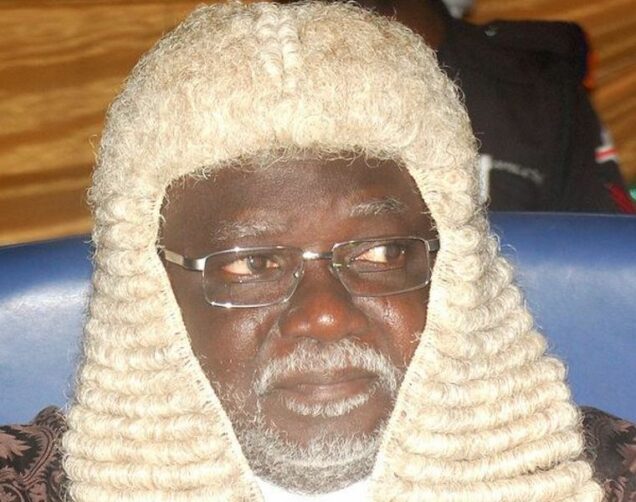The Chief Justice of Nigeria (CJN), Justice Olukayode Ariwoola, has said the Supreme Court has entertained a total of 1,764 cases, consisting of motions and appeals.
Justice Ariwoola disclosed this on Monday in Abuja at the special session of the Supreme Court held to mark the beginning of the 2022/2023 legal year and the swearing-in of 62 newly conferred Senior Advocates of Nigeria (SAN).
He said during the 2021/2022 legal year alone, the apex court entertained a total of 1,764 cases, consisting of motions and appeals.
Out of the figure, he said the justices of the court heard 816 civil, 370 criminal and 16 political matters, making a total of 1,202 motions.
He further said, the court considered a total number of 562 appeals, comprising 341 civil, 186 criminal, and 35 political. A total number of 154 judgments were delivered in the year.
“Our pending (backlog) civil appeals are 4,741 while the number of pending (backlog) criminal appeals is 1,392.
“On the other hand, we have 751 moribund appeals for disposal. That brings the total number of pending (backlog) appeals in this court to 6,884.
“Out of the 4,741 appeals in the court’s docket, 1,495 have briefs filed and exchanged and are ready for hearing; whereas, the remaining 3,246 appeals are having about 10,000 motions, with some contentious and others innocuous in nature.
“As for the pending 1,392 Criminal Appeals, 461 already had briefs filed and exchanged and are ready for hearing. The remaining 931 appeals have about 2,000 different motions for hearing to determine their eligibility for hearing.
“However, the identified 751 moribund appeals are to be disposed of for non-compliance with the Supreme Court Rules, i.e. Order 8 Rule 8”, he said.
Justice Ariwoola said that the court had between Oct. 2021 and Sept. 2022, made a total of 3,563 convictions.
“Available facts on judicial activities in various jurisdictions across the globe still emphatically confirmed that the Supreme Court of Nigeria remains the busiest and most hardworking Supreme Court in the world.
“It is on record that we work from Monday to Friday every week. We conduct sittings on a daily basis. It is only on Wednesdays that we do Chamber sitting to consider non-contentious matters. On Fridays, we deliver judgments and rulings.
“I We are humans and equally have blood running through our veins; if no one praises us, we have the inalienable right and obligation to praise and eulogise ourselves,” the CJN said.
The CJN reiterated that contrary to speculation from some quarters, the Nigerian judiciary, particularly the Supreme Court, has strived to remain independent and withstand external influence.
“The Nigerian Judiciary, to a very large extent, is independent in conducting its affairs and taking decisions on matters before it without any extraneous influence.
“At the Supreme Court, without mincing words, we are completely independent in the way and manner we conduct our affairs, especially in our judgments.
“We don’t pander to the whims and caprices of anybody. If there is anybody to be feared, I must say with full confidence, that it is only the Almighty God. We will never be subservient to anyone, no matter his position or influence in the society.’”
He, however, expressed concerns that with regards to financing, the Nigerian judiciary could not be said to be completely independent.
“Nevertheless, I will make it clear to whoever that cares to listen that when the Nigerian Judiciary is assessed from the financial aspect, we are yet to be free or truly independent.
“The annual budget of the Judiciary is still a far cry from what it ought to be. The figure is either stagnated for a long period of time or it goes on a progressive decline when placed side-by-side with the current realities in the market.
“Prices of goods and services are not getting less or friendly to buyers; while at the same time, our purchasing power is abysmally low and weak enough to transmit on the same wavelength with the market forces.
For his part, the Attorney-General of the Federation and Minister of Justice, Mr Abubakar Malami, (SAN), said he was optimistic that the recent approval for the increase in the salaries and allowances of judges would boost their morale.
“As a result, we have ensured a progressive budgetary allocation to the judiciary which has seen an increase from N73 billion in 2015 to over N130 billion in 2022 and a further increase of N150 billion has been proposed for 2023.”
Also speaking at the event, the Chairman, Body of Benchers, Mr Wole Olanipekun (SAN) corroborated what the CJN said adding that it would be a relief if some political cases do not end up in court.









